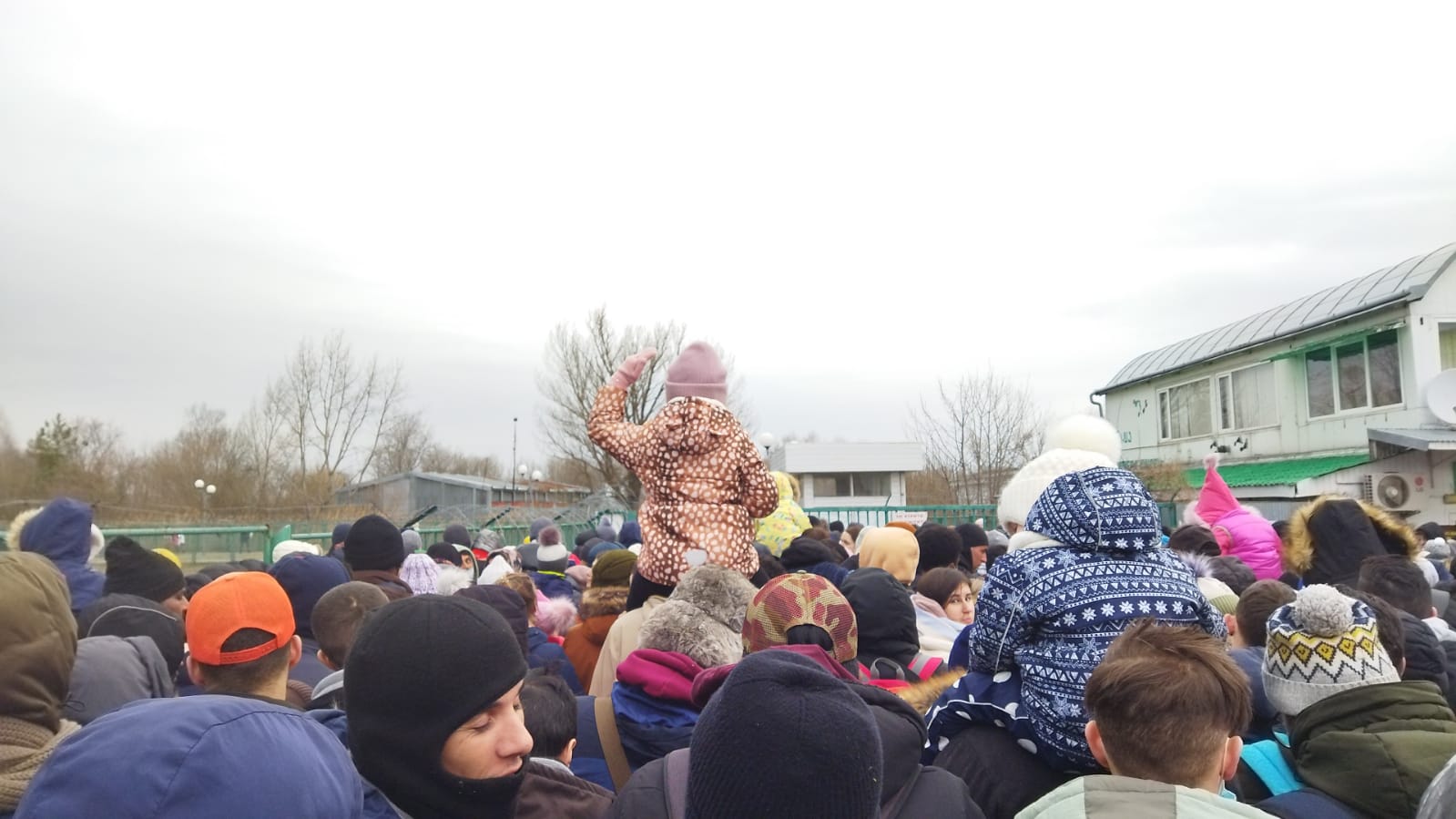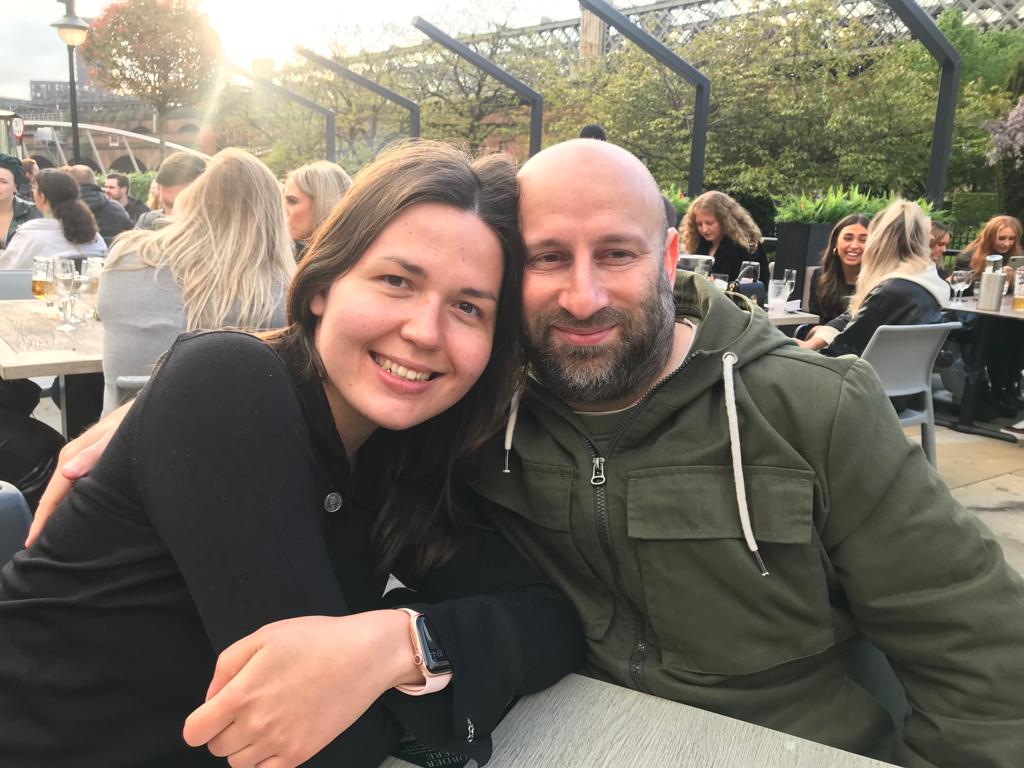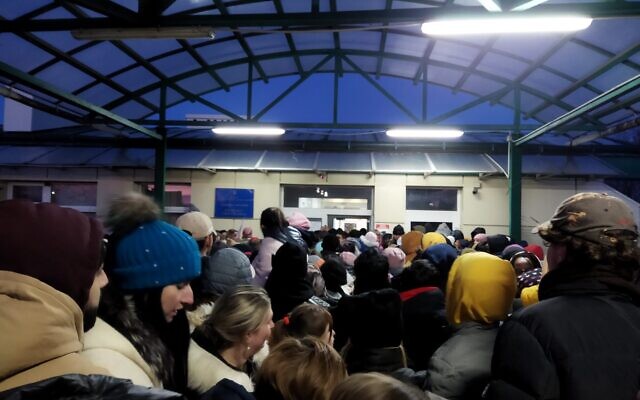British Jew describes ‘pandemonium’ on Polish border as Ukrainians flee war
Mancunian Jeremy Myers caught up in border chaos as thousands flee conflict, where he had to stand for 12 hours at a time and was in a 'dangerous crush' to escape
A British Jewish man has described the horror scenes of thousands of desperate Ukrainians attempting to flee war.
Mancunian Jeremy Myers, 44, became caught up in the crush with his Ukrainian girlfriend after flying to Eastern Europe to see her for Valentines Day.
But when the first bombs hit the country, they planned their escape as his girlfriend of two years, journalist Maria Romanenko, 29, is a prominent anti-Putin activist.
As hundreds of thousands clogged up roads heading for the borders, it took them nearly a day to get to the small crossing town of Shehyni. They were then involved in a 24 hour crush to cross the border to Poland.
“It was absolute pandemonium,” says business consultant Jeremy, speaking safely from Poland. “There was very little organisation and the closer you got to the front, the more people were pushing and shoving. Every so often there would be these big surges and people would be screaming.
“There were lots of young children and it felt very dangerous. Terrifying.
“Fights broke out as people accused others of pushing in or of hurting them. People had blood running down their faces. We saw a couple of women fainting and being carried above the crowd. And there was a strong rumour that someone had been crushed to death – the Polish border guards confirmed they had heard it was true.
“It was beyond unsafe. I have got bruises on me from all the pushing and I am just pleased that we finally managed to make it to Poland.”

Jeremy said there was a festive atmosphere when they first reached the small village of Shehyni. But that quickly dissipated once people realised how slow the queue was moving. “There were probably about 2000 people queuing in the first bit,” he says.
“It was mainly women and children with some older people. There were also a few overseas students. After that initial queue we headed towards a rectangle space, which also had thousands of people, and then into a smaller cage-like pen. At each stage people were getting closer and closer together.
“No one was keeping any order. There were just a couple of soldiers with guns and when anyone went up to them and asked if they could organise the people they just glared back really menacingly.
“At certain times a chant would go up that they needed to set up a separate queue – a corridor for women with young children – but that was ignored. People were trying to help each other if they could, but everyone was in the same miserable position.

“The scariest part was when we got close to the booths – we’d been standing up for about 12 hours by then – as that’s when it really felt like we were in a dangerous crush. There were only three people working in the booths – they were meant to be processing people before they reached passport control – and it was painstakingly slow. There were no toilets and no place to get food or even water. There wasn’t even space to sit down so people had no choice but to stand for hours on end even though they were exhausted.”
Once they had got through the first lot of checked, they were then faced with a second queue for passport control. This took another 12 hours.
Once they were through that, the Polish border was a completely different experience. “It was fully manned and we got through there quickly,” says Jeremy. “Once we were through, there were hundreds of volunteers who gave us food and drink and even clothes. People were standing there with signs offering to take people wherever they wanted to go for free.”
On Tuesday the pair were at the British Embassy in Warsaw when they were shocked to see Prime Minister Boris Johnson arrive. As the PM was grilled by an angry Ukranian journalist, they queued to attempt to get Maria”s visa.
The pair are due to fly to Manchester tomorrow while Maria, who studied at Leeds University, can only watch on in horror as her homeland – where the rest of her family remained – is pummelled by Russian bombs.
“I know she only left the country because I forced her to,” says Jeremy. “But I won”t let her go back there while she could be in danger.”

Thank you for helping to make Jewish News the leading source of news and opinion for the UK Jewish community. Today we're asking for your invaluable help to continue putting our community first in everything we do.
For as little as £5 a month you can help sustain the vital work we do in celebrating and standing up for Jewish life in Britain.
Jewish News holds our community together and keeps us connected. Like a synagogue, it’s where people turn to feel part of something bigger. It also proudly shows the rest of Britain the vibrancy and rich culture of modern Jewish life.
You can make a quick and easy one-off or monthly contribution of £5, £10, £20 or any other sum you’re comfortable with.
100% of your donation will help us continue celebrating our community, in all its dynamic diversity...
Engaging
Being a community platform means so much more than producing a newspaper and website. One of our proudest roles is media partnering with our invaluable charities to amplify the outstanding work they do to help us all.
Celebrating
There’s no shortage of oys in the world but Jewish News takes every opportunity to celebrate the joys too, through projects like Night of Heroes, 40 Under 40 and other compelling countdowns that make the community kvell with pride.
Pioneering
In the first collaboration between media outlets from different faiths, Jewish News worked with British Muslim TV and Church Times to produce a list of young activists leading the way on interfaith understanding.
Campaigning
Royal Mail issued a stamp honouring Holocaust hero Sir Nicholas Winton after a Jewish News campaign attracted more than 100,000 backers. Jewish Newsalso produces special editions of the paper highlighting pressing issues including mental health and Holocaust remembrance.
Easy access
In an age when news is readily accessible, Jewish News provides high-quality content free online and offline, removing any financial barriers to connecting people.
Voice of our community to wider society
The Jewish News team regularly appears on TV, radio and on the pages of the national press to comment on stories about the Jewish community. Easy access to the paper on the streets of London also means Jewish News provides an invaluable window into the community for the country at large.
We hope you agree all this is worth preserving.






















